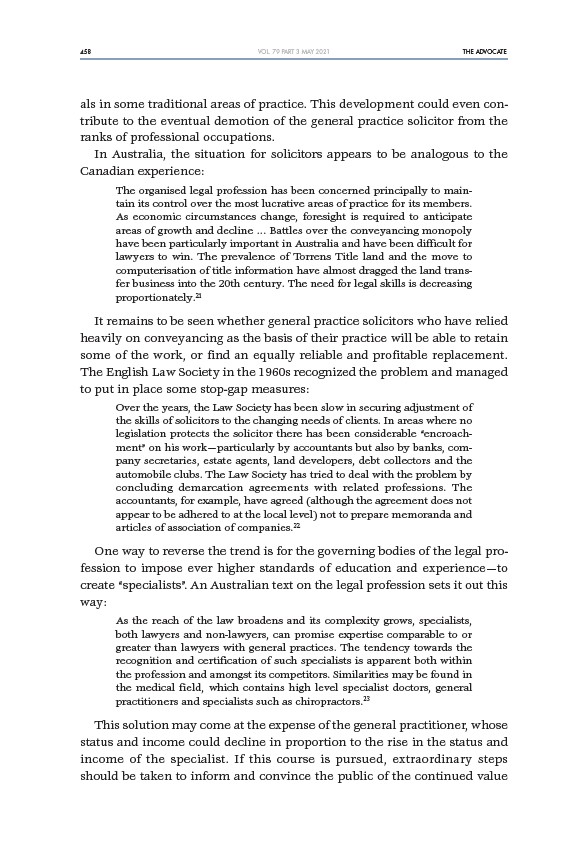
458 THE ADVOCATE
VOL. 79 PART 3 MAY 2021
als in some traditional areas of practice. This development could even contribute
to the eventual demotion of the general practice solicitor from the
ranks of professional occupations.
In Australia, the situation for solicitors appears to be analogous to the
Canadian experience:
The organised legal profession has been concerned principally to maintain
its control over the most lucrative areas of practice for its members.
As economic circumstances change, foresight is required to anticipate
areas of growth and decline … Battles over the conveyancing monopoly
have been particularly important in Australia and have been difficult for
lawyers to win. The prevalence of Torrens Title land and the move to
computerisation of title information have almost dragged the land transfer
business into the 20th century. The need for legal skills is decreasing
proportionately.21
It remains to be seen whether general practice solicitors who have relied
heavily on conveyancing as the basis of their practice will be able to retain
some of the work, or find an equally reliable and profitable replacement.
The English Law Society in the 1960s recognized the problem and managed
to put in place some stop-gap measures:
Over the years, the Law Society has been slow in securing adjustment of
the skills of solicitors to the changing needs of clients. In areas where no
legislation protects the solicitor there has been considerable “encroachment”
on his work—particularly by accountants but also by banks, company
secretaries, estate agents, land developers, debt collectors and the
automobile clubs. The Law Society has tried to deal with the problem by
concluding demarcation agreements with related professions. The
accountants, for example, have agreed (although the agreement does not
appear to be adhered to at the local level) not to prepare memoranda and
articles of association of companies.22
One way to reverse the trend is for the governing bodies of the legal profession
to impose ever higher standards of education and experience—to
create “specialists”. An Australian text on the legal profession sets it out this
way:
As the reach of the law broadens and its complexity grows, specialists,
both lawyers and non-lawyers, can promise expertise comparable to or
greater than lawyers with general practices. The tendency towards the
recognition and certification of such specialists is apparent both within
the profession and amongst its competitors. Similarities may be found in
the medical field, which contains high level specialist doctors, general
practitioners and specialists such as chiropractors.23
This solution may come at the expense of the general practitioner, whose
status and income could decline in proportion to the rise in the status and
income of the specialist. If this course is pursued, extraordinary steps
should be taken to inform and convince the public of the continued value